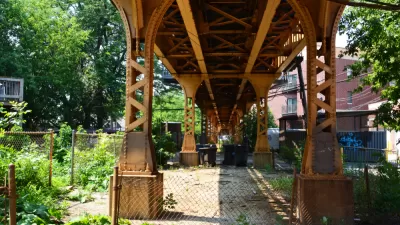In its efforts to build a more environmentally sustainable region by prioritizing transit and transit-oriented development, cities in the Vancouver region also create displacement risks for people who already use and depend on transit.

Christopher Cheung reports on the tradeoffs included in the Vancouver region's ongoing development of new housing along transit routes: the demolition and replacement of old rental buildings "home to vulnerable communities who depend on transit for work."
The question pondered in the article: Do trains really need to cause pain for renters?
According to Cheung, some of the municipalities in the region have responded to the threat of displacement by updating policies to help renters, with "a mix of everything from requiring landlords to offer cash compensation to offering renters a unit in the redeveloped building."
Advocates, however, are pushing for more, suggesting that the province of British Columbia should tweak its Residential Tenancy Act. One potential change that could alleviate the threat of displacement, according to the article would be "to require landlords to allow tenants to return to a comparable unit in the redeveloped building, at the same or similar rent they were paying before," writes Cheung.
More data on the housing market of the region, and the existing demographics of housing along transit routes, are included in the article. The article chooses the city of Burnaby as its primary case study, with the experience of one renter in particular providing a human-interest angle for the story.
FULL STORY: Transit Gain Doesn’t Have to Equal Renter Pain

Maui's Vacation Rental Debate Turns Ugly
Verbal attacks, misinformation campaigns and fistfights plague a high-stakes debate to convert thousands of vacation rentals into long-term housing.

Planetizen Federal Action Tracker
A weekly monitor of how Trump’s orders and actions are impacting planners and planning in America.

In Urban Planning, AI Prompting Could be the New Design Thinking
Creativity has long been key to great urban design. What if we see AI as our new creative partner?

King County Supportive Housing Program Offers Hope for Unhoused Residents
The county is taking a ‘Housing First’ approach that prioritizes getting people into housing, then offering wraparound supportive services.

Researchers Use AI to Get Clearer Picture of US Housing
Analysts are using artificial intelligence to supercharge their research by allowing them to comb through data faster. Though these AI tools can be error prone, they save time and housing researchers are optimistic about the future.

Making Shared Micromobility More Inclusive
Cities and shared mobility system operators can do more to include people with disabilities in planning and operations, per a new report.
Urban Design for Planners 1: Software Tools
This six-course series explores essential urban design concepts using open source software and equips planners with the tools they need to participate fully in the urban design process.
Planning for Universal Design
Learn the tools for implementing Universal Design in planning regulations.
planning NEXT
Appalachian Highlands Housing Partners
Mpact (founded as Rail~Volution)
City of Camden Redevelopment Agency
City of Astoria
City of Portland
City of Laramie





























